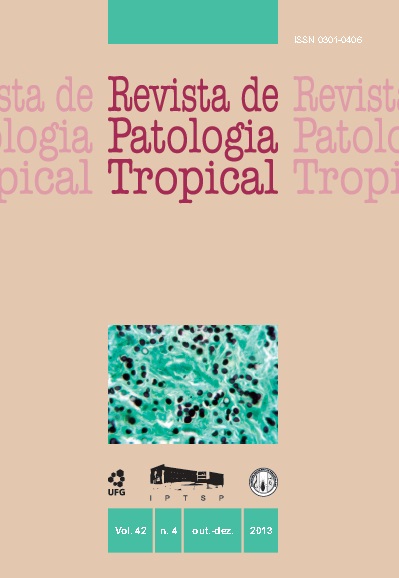OVOS DE Enterobius vermicularis EM SALAS DE ESPERA E BANHEIROS DE UNIDADES BÁSICAS DE SAÚDE (UBS) DO MUNICÍPIO DE NOVA SERRANA-MG: CONTRIBUIÇÕES PARA O CONTROLE
DOI:
https://doi.org/10.5216/rpt.v42i4.27928Palavras-chave:
Parasitos intestinais, Enterobius vermicularis, Unidades Básicas de Saúde, Nova Serrana, MGResumo
Neste trabalho, avaliou-se, utilizando a técnica de Graham (1941), a presença de ovos de helmintos intestinais em amostras coletadas em objetos de cinco Unidades Básicas de Saúde (UBS) da cidade de Nova Serrana-MG. No total de oito coletas, foram amostrados, nas recepções, 40 mesas de atendimento e 40 assentos de cadeiras e, nos banheiros, 64 maçanetas internas e 64 maçanetas externas de portas. Todas as lâminas foram analisadas por microscopia óptica nos aumentos de10X e 40X no Laboratório de Microscopia da FUNEDI/UEMG e reexaminadas no Laboratório de Helmintologia e Malacologia Médica do Centro de Pesquisas René Rachou (FIOCRUZ-Minas). Os resultados indicaram a presença de ovos de Enterobius vermicularis, em sua maioria, viáveis, sendo os percentuais de ocorrência calculados por meio de proporção simples. Na recepção, a porcentagem de contaminação foi de 25,0% nas mesas de atendimento e de 17,9% no assento das cadeiras; nos banheiros, 35,7% das maçanetas internas e 21,4% das maçanetas externas apresentaram ovos. Não foram encontrados ovos e larvas de outros helmintos, apenas grãos de pólen, fibras vegetais e esporos de fungos. Foram realizadas palestras direcionadas aos funcionários destas UBS para apresentar-lhes os resultados e discutir medidas para evitar a contaminação de pessoas que frequentam e trabalham nestes locais. Os dados evidenciaram que as salas de espera das UBS podem ser importantes veículos de dispersão e contaminação de enteroparasitos. Medidas de educação em saúde são importantes e devem ser realizadas entre os usuários e funcionários dos postos, pois levam as pessoas a conhecer o problema, mudar seus hábitos e discutir soluções para prevenção e controle desta e de outras endemias.
Downloads
Downloads
Como Citar
Edição
Seção
Licença
The manuscript submission must be accompanied by a letter signed by all authors stating their full name and email address, confirming that the manuscript or part of it has not been published or is under consideration for publication elsewhere, and agreeing to transfer copyright in all media and formats for Journal of Tropical Pathology.

